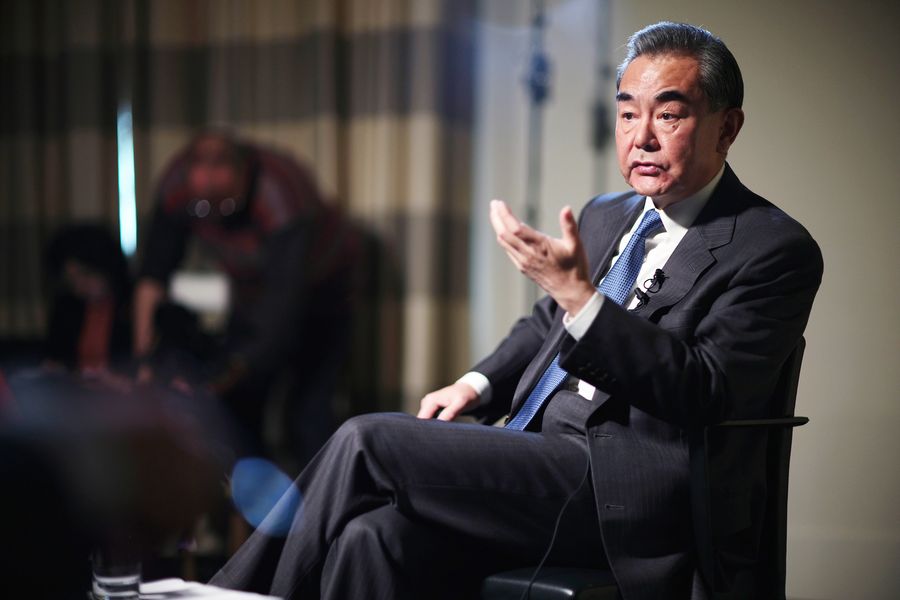
Chinese State Councilor and Foreign Minister Wang Yi speaks in an interview with Reuters in Berlin, Germany, Feb. 14, 2020. (Xinhua/Wang Qing)
"We need to get rid of the division of the East and the West and go beyond the difference between the South and the North, in a bid to build a community with a shared future for mankind," says Wang Yi, Chinese State Councilor and Foreign Minister.
MUNICH, Germany, Feb. 15 (Xinhua) -- Chinese State Councilor and Foreign Minister Wang Yi on Saturday called for crossing East-West difference and practicing multilateralism at the Munich Security Conference (MSC).
In his speech, Wang elaborated the attendees on the current situation of China's fight against the outbreak of the novel coronavirus under the leadership of Chinese President Xi Jinping.
The top diplomat said that the strict measures taken by the Chinese government are taking effect, and China is fully confident in and capable of winning the fight against the epidemic.
"I believe that after the epidemic, the Chinese economy will stride forward on a healthier and more sustainable track. The Chinese people will become more resolute to build a moderately prosperous society in an all-round way, eradicate the absolute poverty and achieve the great rejuvenation of the Chinese nation," Wang said.
He added that the epidemic had made mankind realize that it is now an era with traditional and non-traditional security threats being interweaved. A regional issue can be transformed into a global one, and vice versa. Therefore, no country can stay alone and be immune to the threats. Instead, all countries are inter-connected and share a common destiny.
"Strengthening global governance and international coordination is urgent right now. We need to get rid of the division of the East and the West and go beyond the difference between the South and the North, in a bid to build a community with a shared future for mankind," added Wang.
Wang made four suggestions for multilateralism. Firstly, countries should stick to multilateralism and seek common development. Multilateralism denies the priority of a single state; instead, it holds that all countries share the same right for development.
"It is not multilateralism if only the Western countries prosper while the non-Western countries lag behind forever. It would not achieve the common progress of mankind," said Wang.
"China's modernization is the necessity of history. China's national conditions decided that it could not copy the Western pattern, and China's cultural genes do not allow the country to follow an old way of seeking hegemony as major powers in history," said Wang.
He said China sticks to peaceful development, seeks cooperation and a win-win deal with the world. The socialist path with Chinese characteristics has achieved great success and is showing energetic vitality and promising future.
China respects the Western countries' choices and hopes to learn from developed countries' experience in a bid to achieve common prosperity, he said.
Meanwhile the West should also discard its subconscious mentality of civilization supremacy, give up its bias and anxiety over China, and accept and welcome the development and revitalization of a country from the East with a system different from that of the West, Wang said.
Secondly, Wang noted that major nations should practice what they preach when it comes to sticking to multilateralism. Success of multilateralism calls on major nations to play key roles and take major responsibilities.
Therefore, big nations must shoulder responsibilities and safeguard the common interests of all countries, Wang said.
He added major nations should strive to maintain the openness of the world, not to confront and counteract each other, and to join hands to safeguard world peace and stability.
Wang said China will further deepen the strategic partnership of coordination with Russia, continue to explore ways of peaceful coexistence and win-win cooperation with the U.S., and will comprehensively deepen cooperation with Europe.
Thirdly, Wang noted that international norms should be upheld in sticking to multilateralism.
He said multilateralism does not accept unilateral acts, and it implicates that international relations should be democratized and should be based on the rule of international law and the upholding of global justice.
China has always adhered to its original aspiration and is a firm defender of the international law and the purposes of the UN Charter, said Wang.
He added that China's foreign policy is based on the purpose of maintaining global peace and promoting common development, and stems from the adherence to the basic principles of international law and international relations, therefore it is not affected by temporary events and has no self-interest.
It has stood the test of history and won the trust of countries worldwide, said Wang.
Fourthly, he noted that the awareness of the community should be fostered in sticking to multilateralism.
Wang said that China's proposal to build a community with a shared future for mankind is based on the Chinese cultural tradition "all under heaven are of one family", reflecting the profound thinking and humanistic care of the future for mankind.
Wang said China is willing to work with all parties to transcend social systems, history, culture, and different stages of development, to take good care of the planet, and to build a global village shared by all.■



